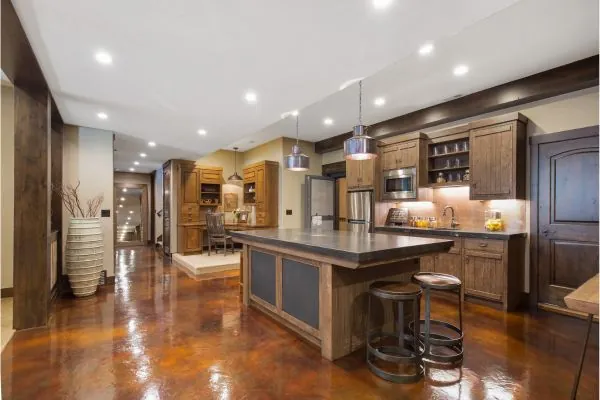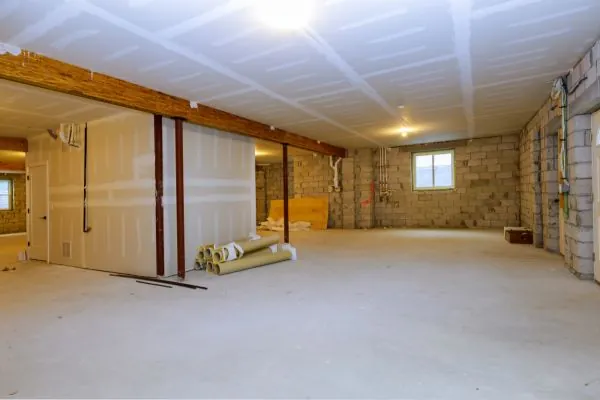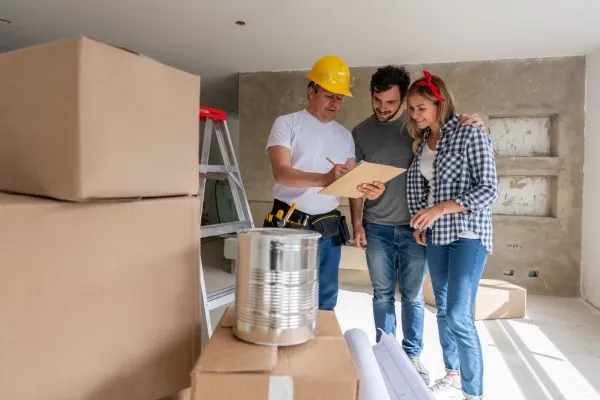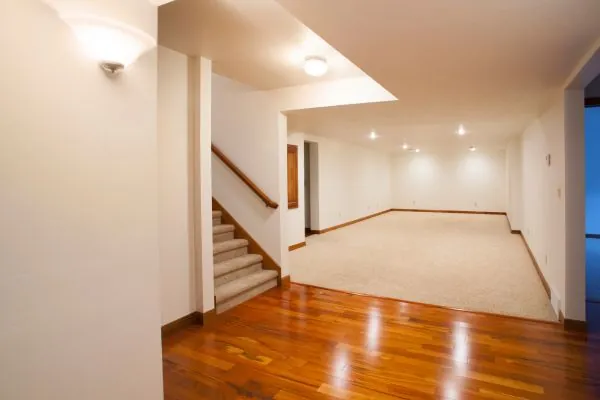Finishing a basement is one of the best ways to add living space and increase your home’s value, but many homeowners in Massachusetts often wonder, “How much does it cost to finish a basement?” The answer can vary greatly, depending on several factors like the space size, the materials you choose, and the finishing touches you want.
In this guide, we will break down the essential expenses and considerations so you can make informed decisions. We will also offer tips to help you stay within your budget while still achieving the basement of your dreams. So, if you are ready to transform that unused space into something functional and beautiful, let’s start!
Understanding Basement Finishing in Massachusetts
Finishing a basement in Massachusetts can be rewarding, transforming unused space into a functional and beautiful area. However, it is essential to understand the unique challenges and benefits of basement finishing in this region. Such factors can include the following:

Importance of Finishing a Basement
Basement remodeling in Massachusetts is more than just an aesthetic upgrade, it can significantly increase your home’s value and usable living space. In Massachusetts, where homes often face cold winters, finishing a basement enhances energy efficiency by providing better insulation. A basement is a great way to add more space to your home.
Everyday Purposes for Finishing a Basement
The reasons for finishing a basement vary, but many Massachusetts homeowners do it to create additional living space. Some transform their basement into a family room, home office, or guest bedroom. Others design it as an entertainment space with a bar, game room, or home theater setup that gives you more space to live and play.
Factors Influencing Costs in Basement Finishing

Several factors can significantly impact the overall cost when it comes to finishing a basement in Massachusetts. From the size of your basement to the quality of materials used, each decision shapes the final price tag. Here are some of the key elements that influence the cost of finishing a basement:
Size and Layout of the Basement
The size and layout of your basement are among the most significant factors influencing the costs that you should be prepared for. Larger basements naturally require more materials, labor, and time, which increases the overall expense. Similarly, basements with unusual layouts or additional structural needs—such as low ceilings or uneven flooring—can lead to higher costs due to the extra work involved.
Quality of Materials Used
The materials you choose for your basement finishing project are crucial in determining costs. High-end materials such as premium flooring, luxury fixtures, and energy-efficient insulation can significantly raise the project’s price. On the other hand, opting for budget-friendly materials can help reduce expenses but may not offer the same durability or aesthetic appeal. Investing in quality more than pays for itself.
Complexity of Design
A more complex design can drive up the cost of basement finishing. Custom features such as built-in shelving, specialty lighting, or a unique ceiling design require skilled labor and more execution time, leading to higher expenses. Adding features like a wet bar, bathroom, or kitchenette also requires additional plumbing and electrical work, which increases the overall complexity and cost.
Breakdown of Costs
Understanding the specific costs of finishing a basement helps homeowners in Massachusetts plan their budgets effectively. Different project elements, such as framing, insulation, plumbing, and electrical work, each carry their own price tags.

Framing and Insulation
The framing process involves building the structure of your basement’s walls and dividers, which typically costs between $7 and $15 per square foot. Insulation, particularly important in Massachusetts’ cold climate, helps regulate temperature and energy efficiency. Depending on the type of insulation you choose, costs can range from $1 to $3 per square foot.
Plumbing and Electrical Work
Plumbing costs can vary widely depending on the system’s complexity and the amount of work needing it to be done before and after. Costs can average $1,000 to $3,000. Electrical work, which includes wiring for lighting, outlets, and any appliances, generally range from $2,000 to $5,000, depending on the scope of the work done.
Flooring Options
Flooring options like carpet, laminate, vinyl, and tile come with a wide range of initial costs that can impact your basement finishing budget. Carpet tends to be the most affordable, averaging $3 to $5 per square foot, while tile and luxury vinyl can cost $5 to $10 per square foot. Choosing the right flooring now will save you time and money later on!
Ceiling and Lighting Installations
Ceiling and lighting installations add the finishing touches to your basement, creating a polished and functional space. Drop ceilings or drywall ceilings typically cost $2 to $6 per square foot, depending on the materials used. Lighting can range from basic fixtures to custom recessed lighting, costing anywhere from $500 to $2,500 based on your selections.
Affordable Ways to Finish Your Basement

Finishing a basement does not have to break the bank. You can create a beautiful and functional space without overspending with careful planning and smart choices. Below are some excellent tips that will guide you in making informed decisions that keep your budget intact while enhancing your home’s value and livability.
Choosing Cost-Effective Quality Materials
One of the most effective ways to save on basement finishing costs is by selecting cost-effective yet quality materials. Look for alternatives to high-end options that maintain durability and aesthetics without the hefty price tag. For instance, laminate flooring can mimic the look of hardwood for less, and some flooring materials can be bought cheaper at certain times of the year.
Hiring Basement Professionals
While tackling a basement finishing project independently may seem tempting, hiring basement professionals can save you money in the long run. Experienced contractors can help you avoid costly mistakes and ensure the job is done right the first time. They also have access to industry discounts on materials and can streamline the process, saving you time and frustration.
Timing Your Project for Off-Season Rates
Timing your basement finishing project can significantly impact costs. Many contractors experience a slow season during the fall and winter months, leading to potential discounts and lower labor rates. Additionally, less competition for contractor availability can give you more flexibility in scheduling.
Legal and Safety Considerations
Adhering to local building codes and regulations is crucial when finishing a basement in Massachusetts. Before starting your project, check with your municipality to determine if permits are required for electrical work, plumbing, or structural changes. Obtaining the necessary licenses ensures that your renovation complies with safety standards and protects your investment. Failing to do so can lead to costly fines or complications when selling your home in the future.
Building codes in Massachusetts
In Massachusetts, several building codes govern the finishing of bathrooms to ensure safety and functionality. Ceiling height is critical; bathrooms must have a minimum ceiling height of 7 feet (2134 mm) as per the Massachusetts Building Code (780 CMR). Clear floor space is also regulated, requiring at least 21 inches between fixtures and walls, with a recommended spacing of 30 inches for comfort.
Regarding plumbing, fixtures must be constructed from approved smooth and impervious materials. The minimum shower size is specified as 30 inches by 30 inches 1. Additionally, flooring must be non-slip to prevent accidents, with ceramic tiles needing a coefficient of friction rating of at least 0.5 when wet.
Necessary permits and inspections
Generally, a building permit is required for significant changes, particularly those involving plumbing, electrical work, or structural modifications. A permit may not be needed for minor projects like replacing fixtures without altering existing plumbing or electrical systems. However, any electrical work typically requires a permit, regardless of scope.
In addition to the building permit, specific plumbing and electrical permits must be obtained from local authorities if the work involves new installations or significant alterations. Inspections are also mandated at various project stages to verify that all work meets safety standards and regulations. Failing to secure the appropriate permits can lead to fines, work stoppages, and complications when selling the property in the future.
Conclusion
Finishing a basement in Massachusetts can be a rewarding investment that adds functional space and value to your home. By understanding the costs involved, exploring affordable options, and keeping legal and safety considerations in mind, you can transform your basement into a versatile living area. Whether aiming for a cozy family room or a fully equipped guest suite, careful planning and wise decisions will help you achieve your goals while staying within budget. Call today to get started on your basement finishing project!
